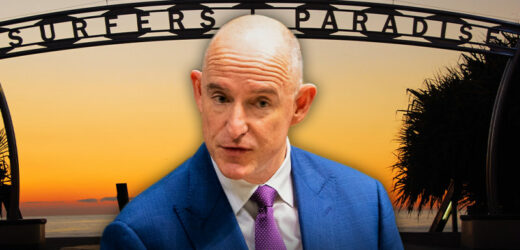Save articles for later
Add articles to your saved list and come back to them any time.
Former cabinet minister Stuart Robert held many jobs in government before he suddenly resigned from federal parliament this month, giving him years of access to portfolios ranging from defence to treasury and social services.
But the issue on his mind one Thursday afternoon in the winter of 2017 was a potential deal to upgrade the street lights at the Gold Coast City Council.
Stuart Robert emailed himself an internal document from the Gold Coast Council about upgrading lighting systems.Credit: Alex Ellinghausen/istock
Robert emailed himself an internal document from the council about upgrading lighting systems that cost the council about $10 million a year. How he obtained the document is not clear, but what he did with it is now known thanks to the leaking of a cache of emails that reveal Robert as a backroom deal-maker for business figures in his inner circle.
Using his private email account, Robert emailed himself the confidential memo that described the council’s lighting upgrade options. He also emailed a Taiwanese company, Formosa Energy, whose executives he had met weeks earlier on a taxpayer-funded visit to Taipei.
“I have spoken to the Gold Coast City Council… and they are particularly excited about potentially working with you on the nation’s first citywide lighting replacement program,” Robert wrote to Formosa.
The opportunities would be huge, he told them in an email on June 19. Robert, who represented the Gold Coast community as the member for Fadden for 16 years, described the council project as a deal that could lead to work with federal departments including Defence.
Robert was a backbencher at this time. He had been sacked from the ministry in February 2016 after a scandal over his decision to fly to Beijing to help a mining company led by Liberal Party donor Paul Marks. He would not return to the ministry until the leadership spill in August 2018 that would install his close friend, Scott Morrison, as prime minister.
Even on the backbench, however, he was active in helping close friends who sought government business. So, he made another suggestion to Formosa. He told its executives that in order to win deals, they should hire a Canberra consulting company, Synergy 360, that was part-owned by two of his friends: businessman David Milo, and, Robert’s chief political fundraiser, John Margerison.
“His and his team’s capacity to manage these engagements and deliver for you is first-rate,” he wrote to Formosa about Milo. “I know him well and he is first class and his teams are first class (I have used them before for some very complex work).”
Synergy 360part-owner David Milo, his friend Coalition MP Stuart Robert and another Synergy 360 co-owner John Margerison.Credit: Fairfax Media
The leaked emails reveal Synergy 360 then contacted Formosa directly and proposed the Taiwanese firm pay Synergy 360 a sum of $57,000 to secure the Gold Coast contract. Included in the pitch was content from the internal council memo that Robert had earlier emailed to himself.
No deal ever eventuated, but the emails make it clear that Robert had actively sought to help Synergy 360 win work and had introduced the firm to a potential new client in Formosa and a potential new contract in the form of the lighting upgrade.
The email cache also makes clear that Robert – as both a backbencher and a minister – would, on multiple occasions, assist Synergy 360 as it attempted to secure new corporate clients and help them win government contracts.
A key question remains: why was the MP for Fadden so keen for Synergy 360 to succeed?
Robert has quit parliament and a date has been set to choose his successor at a byelection on July 25, but the questions about his business dealings will not go away. Over a series of investigations, this masthead has revealed the former MP:
- used his status as a federal MP in 2017 and 2018 to help Synergy 360 sign up corporate clients;
- met Milo and tech giant Infosys before and after the agency he supervised as minister, Services Australia, finalised a $135 million project with Infosys in November 2019;
- helped another of Milo’s clients, tech giant Unisys, secure a meeting to promote its border security offerings to a parliamentary committee that oversaw the peak federal corruption watchdog;
- attended a meeting at Margerison’s home on the Gold Coast in November 2017 with Milo and top executives from Unisys.
Other examples raise further questions about whether Robert helped Milo gain business. The Liberal MP used his personal email account, for instance, to encourage Milo to contact the Singaporean High Commissioner in Australia, to whom Robert had spoken about Singapore’s $2 billion investment in Shoalwater Bay defence facilities in Queensland.
On May 11, 2017, Robert told Milo he had been “chatting to the Singaporean High Commissioner, Kwok Fook Seng” about Singapore’s $2 billion investment in defence facilities in Shoalwater Bay and Townsville in Queensland.
In the email, Robert revealed the high commissioner had told him how the Singaporeans were relying on “local emergency services and medical support and the support they bring themselves” and that this left “an opportunity for an Australian firm like Aspen Medical to engage with them” and become Singapore’s medical service provider in Australia.
”The High Commissioner thought the idea was great and I indicated you would call him directly to seek a meeting and discuss this with him. He warmly welcomed that,” Robert wrote, supplying the high commissioner’s mobile number. He finished his email to Milo by writing: “He is expecting your call. Hon Stuart Robert MP.“
On May 31, 2017, Milo wrote to Glenn Keys, the founder of Aspen Medical, to pitch the prospect of having the firm provide medical support to Singaporean forces in Australia.
A review by former senior public servant Ian Watt, commissioned by the agencies that report to Government Services Minister Bill Shorten, raised concerns about the conflict of interest management processes related to several of the contracts Synergy helped its clients win.
The scandal reached new heights last month when a parliamentary committee chaired by Labor MP Julian Hill extracted a remarkable piece of evidence from Margerison, who until recently was a Synergy shareholder.
Margerison told the committee that leaked emails from late 2017 described an arrangement in which any profits Margerison received care of his family trust’s shareholding in Synergy would be distributed to a financial entity of which Robert was a beneficiary. It was not clear from Margerison’s evidence whether the arrangement referred to was ever finalised or executed.
This revelation leaves open a question that Shorten asked in parliament this month, after Robert announced his resignation: “Did the member [Robert] ever, directly or indirectly, seek to, or receive, a financial benefit from Synergy 360?”
In his evidence to parliament, Margerison stressed that he was never actually paid any money by Synergy. The reason he made this point is obvious: it is another way of saying that Robert also received no benefit.
But Shorten also queried whether Robert had used his status as a public official in the expectation of a later financial reward, even if it was never paid. The evidence of Margerison of how he intended to distribute his Synergy 360 profits is unclear but leaves this open as a possibility.
“I think that there are still more questions than answers about all the relationships, possible conflicts of interest and financial structures of the protagonists,” Shorten said on Monday.
Robert told this masthead on Monday: “I was not paid by any party for any activity, I never sought any payment, none has ever been offered.”
Despite the emails detailing his assistance for Milo and Synergy 360, Robert also maintained that he “never assisted any companies to win any contacts”. Rather, the Liberal politician characterised his repeated support of Synergy as an act of benevolence.
“If my advice is sought I provide it freely,” Robert said in his statement, and he stressed that he had “no involvement” in the Gold Coast City Council.
In denying any wrongdoing, Robert has also raised questions about the provenance of the leaked emails. Both Robert and Milo have accused the ex-partner of another of Synergy 360’s shareholders of having unauthorised access to the emails. This claim has been denied – and neither Milo nor Robert have provided evidence to substantiate their allegation.
There is also no evidence that the emails have been altered, as Milo has claimed. To the contrary, a metadata analysis confirms the emails are genuine.
Geoffrey Watson, former counsel assisting the NSW Independent Commission Against Corruption, says the National Anti-Corruption Commission should examine Robert’s dealings with Synergy 360. Watson said it was “impossible to brush aside” the questions over the personal connections between Robert and his friends – including whether those interests included the way friends such as Margerison helped raise funds for the Liberal Party.
“The central issue here is whether or not Robert was motivated by the public interest or personal interests,” said Watson.
“There are a number of matters surrounding Mr Robert which, taken individually, are significant, but taken collectively are strongly suggestive the NACC should take a close look.
“It is within the NACC’s jurisdiction and should be investigated.”
Cut through the noise of federal politics with news, views and expert analysis from Jacqueline Maley. Subscribers can sign up to our weekly Inside Politics newsletter here.
Most Viewed in Politics
From our partners
Source: Read Full Article




